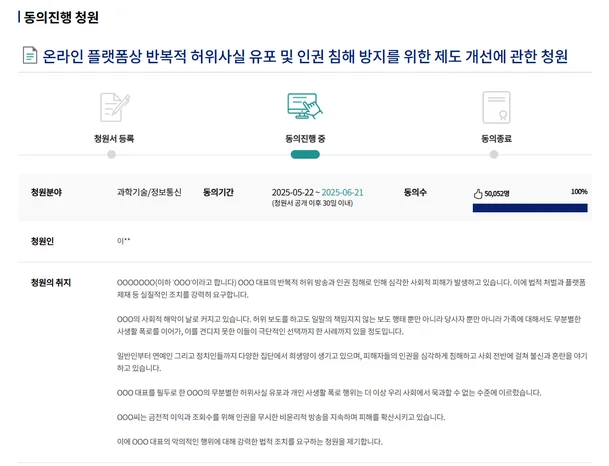“Anti-Garo Sero Act” Petition Surpasses 50,000 Signatures in 11 Days, Sparking Legislative Momentum

In a powerful display of public sentiment, a national petition calling for legal reforms against the spread of unverified online allegations, informally dubbed the “Anti-Garo Sero Act,” has crossed 50,000 signatures in just 11 days, signaling growing demand for stricter regulations on online platforms.

The petition, officially titled “Institutional Reform to Prevent Repeated Spread of False Information and Human Rights Violations on Online Platforms”, was submitted to the National Assembly’s public petition platform on May 22. As of 2 PM, June 3, the initiative had met its threshold, ensuring that it will now be reviewed by a parliamentary committee.
The petitioner directly named the controversial YouTube channel Garo Sero Institute (Gaseyeon), which has come under fire for making sensational and allegedly false claims about celebrities and public figures. The petition states:
“Due to repeated broadcasts spreading false claims and violating individuals’ rights, significant social damage is occurring. We urgently demand legal consequences and stricter platform regulations to prevent further harm.”
This groundswell of support underscores rising frustration with so-called **”cyber wreckers”**—content creators who exploit unverified accusations for views and profit, often with devastating consequences for their targets.
One supporter commented, “We’ve witnessed celebrities, politicians, and even their families suffer irreparable damage due to baseless exposés. We can’t stay silent anymore.”

Momentum behind the petition grew after Kim Soo-hyun filed a ₩12 billion KRW lawsuit against Garo Sero Institute for defamation, accusing the channel of spreading false claims about his alleged relationship with the late Kim Sae-ron and implying involvement in her death.
In response, Garo Sero Institute released an audio clip, while Kim Sae-ron’s family countered with a complaint, accusing Kim of violating child welfare laws and making false statements.
As these legal battles unfold, the “Anti-Garo Sero Act” has become a focal point of national conversation, symbolizing a larger demand for accountability and responsible online conduct. Its rapid climb to the National Assembly floor reflects a deep and urgent public desire for systemic reform to curb digital defamation and safeguard human rights.


